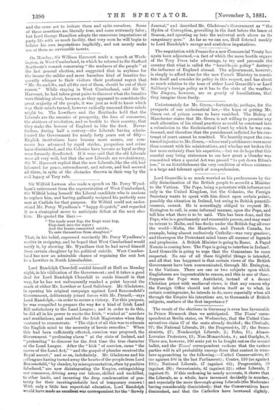Lord Granville is as much worried as his predecessors by
the silly disinclination of the British people to accredit a Minister to the Vatican. The Pope, being a potentate with influence not only in the United Kingdom, but the Colonies, the Foreign Secretary wants to speak with him direct upon certain points, possibly the situation in Ireland, but owing to British punctili- ousness, cannot. He is accordingly obliged to request Mr. Ellington to call, in some informal manner, upon the Pope, and tell him what there is to be said. This has been done, and the Pope, who is a gentlemanly and reasonable person, and may want to retreat to Malta, and has flocks under the British flag all over the world—Malta, the Mauritius, and French Canada, for example, being almost exclusively Catholic—was very gracious, and thereupon the Protestant mind bases all manner of legends and prophecies. A British Minister is going to Rome. A Papal Nuncio is coming here. The Pope is going to interfere in Ireland. Lord Granville is going to urge that the Guarantees be more respected. No one of all these frightful things is intended, and all that has happened is that certain views of the British Government have been communicated, through Mr. Erringtou, to the Vatican. There are one or two subjects upon which Englishmen are impenetrable to reason, and this is one of them. Suppose the Pope were Antichrist, instead of a decent Christian priest with mediaeval views, is that any reason why the Foreign Office should not inform itself as to what, in certain contingencies, he intends to do, more especially when all through the Empire his intentions are, to thousands of British subjects, matters of the first importance ?


































 Previous page
Previous page